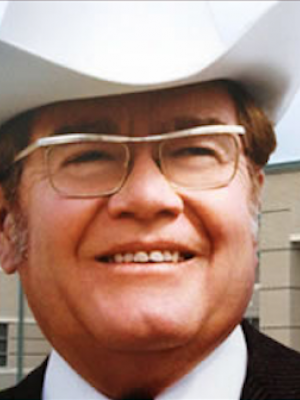
Briscoe was born and raised in Uvalde and developed an interest in politics at an early age. His father, a self-made millionaire, was friends with former Gov. Ross Sterling, and Briscoe once stayed at the governor's mansion as a young boy.
After graduating as valedictorian from Uvalde High School, Briscoe enrolled at the University of Texas at Austin, where he met his beloved wife Janey. They were married in 1942 and went on to have three children.
Briscoe first was elected to statewide office as a state representative in 1948, and he immediately became a changemaker. In 1949, he advocated for the Gilmer-Aiken Act, which transformed Texas public schools, consolidated many rural schools, and established the first comprehensive school funding system. The law also created the State Board of Education and what is now called the Texas Education Agency.
Also in 1949, Briscoe was the driving force behind the creation of the state's farm-to-market road system, which has been the single greatest economic stimulus to rural Texas.
After serving four terms as state representative, Briscoe returned home in 1957 to head the family ranching business. By 1972, he was the state's largest individual landowner.
After many years away from state politics and in the wake of the Sharpstown stock fraud scandal, Briscoe became the first governor elected from southwest Texas in 1972.
As governor, he increased education funding by $4 billion and raised teacher salaries by the highest percentage in history - without raising taxes. Briscoe also appointed the first black members to state boards and appointed a larger number of women and minorities to government positions than any previous governor.
He served as governor until 1979 and returned to his cattle ranching and banking business in Uvalde. Friends and colleagues from both political parties say that despite his wealth and power, Briscoe was an honest, humble man brimming with integrity who treated everyone with respect throughout his entire life.
As much as he made history, Briscoe was perhaps more passionate about preserving it.
Much of Briscoe's philanthropic efforts - and millions of his dollars - have been aimed at Texas historical institutions, including the Dolph Briscoe Center for American History at UT Austin.
Briscoe and his wife considered San Antonio their second home and many local historical and educational institutions also benefited from their generosity, including the UT Health Science Center at San Antonio, the University of Texas at San Antonio, St. Mary's University, the Witte, and the Dolph and Janey Briscoe Western Art Museum.
Briscoe died on June 27, 2010 at the age of 87.
Sources: Dolph Briscoe Center for American History, San Antonio Express-News, University of Texas Chancellor Francisco Cigarroa, Texas State Library & Archives Commission
